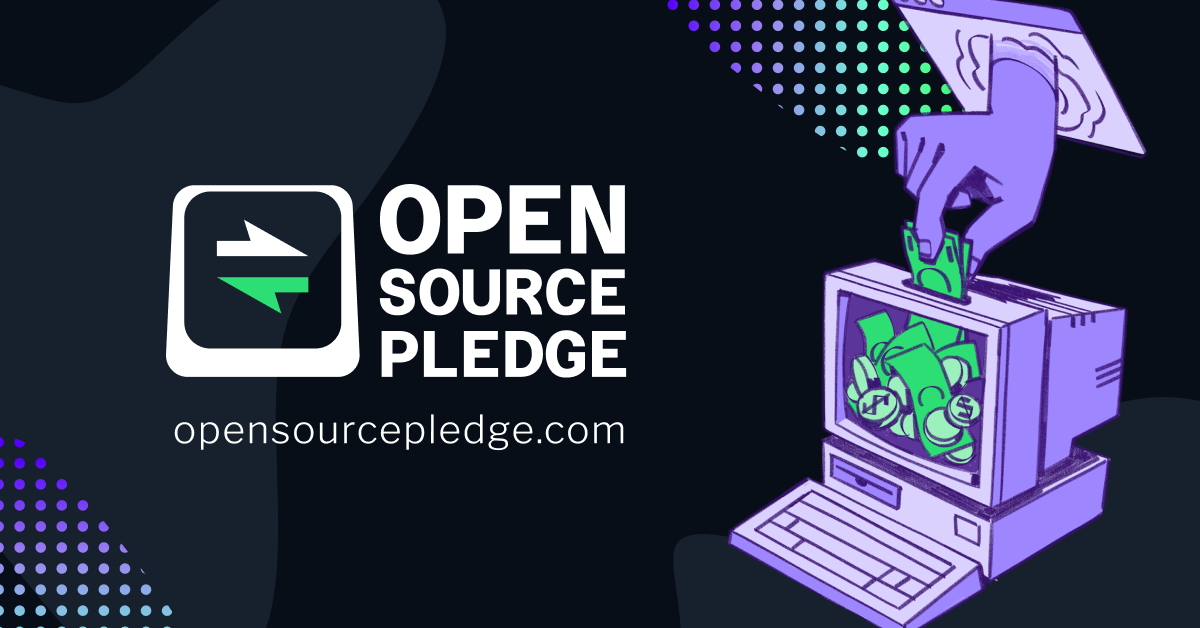Open-source software development has followed the same cycle for decades: passionate developers create innovative tools that attract the attention of large companies.
Then, as companies adopt these tools, the people who maintain the software can become overwhelmed by skyrocketing demand — without compensation to match the money businesses are making from it.
While initiatives like GitHub Sponsors, Open Collective and Tidelift have sought to address this imbalance, a new initiative called the Open Source Pledge is stepping up to address the problem more directly. Officially launched today, the initiative has already attracted 20 companies that have collectively pledged nearly $1.3 million to fairly compensate maintainers.
“In a grocery store, I pay for the food first and then I take it home and eat it,” Chad Whitacre, Sewickley resident and leader of the Open Source Pledge, told Technical.ly. “In a restaurant, I eat the food first, and then the question is, am I going to pay for it?”
Open source relies on the latter, but instead of a law requiring payment, efforts like the Open Source Pledge aim to change the status quo.
The pledge requires companies to commit a significant yearly contribution to maintainers and publish an annual report detailing these contributions.
The minimum threshold to join the pledge is $2,000 per year per developer, meaning a company with 100 developers would need to contribute $200,000 annually. This extra step of mandatory annual reports promotes awareness and accountability for the companies that pledge, Whitacre said.

Software monitoring platform Sentry is leading the pledge. The company began as an open-source side project in 2008 and transitioned to a venture-backed company in 2015.
As head of open source at Sentry, Whitacre has overseen the company’s longstanding support for open source projects. Last year, Sentry committed $500,000 to support over 500 open-source maintainers, distributing the funds through donation websites GitHub Sponsors and Thanks.dev.
“Basically, we’ve been doing the pledge program ourselves for the past three years, and it’s grown every year,” Whitacre said. The company contributed $155,000 in 2021 and $260,000 in 2022. “The goal this year was to not only do our own program but to spread it to others.”
Companies make billions on coders working for free
The pledge aims to reduce burnout, emphasizing that while open-source software is free, maintainers’ efforts should not be, according to Whitacre.
Six in 10 open-source project maintainers say they haven’t been paid for their efforts, according to Tidelift’s 2024 State of Open Source Maintainers Report, which gathered responses from over 400 maintainers. This lack of compensation can impact the quality of open-source projects, as paid maintainers are more likely to implement critical improvements and security practices.
This issue of open-source project maintenance has become increasingly urgent in light of recent security incidents, such as the XZ Utils hack in March. A Microsoft developer discovered a backdoor in the widely used open-source compression software. The supply chain attack could have allowed malicious actors to compromise systems using XZ Utils, potentially affecting millions of users and applications.
Following this event, two-thirds of maintainers, those who lead the projects, reported being less trusting of contributors, those who give input to a project, with many tripling their time spent on security compared to a few years ago, according to Tidelift’s 2024 report.

Whitacre also sees the Open Source Pledge as a significant opportunity to address what he describes as an “economic value vacuum” created by open source.
Unlike traditional business models where payment precedes value, open source delivers benefits upfront, allowing companies to leverage valuable tools without initial investment.
The total value of open-source software is hard to accurately estimate, but research suggests the value companies get from widely used open-source software is around $4.15 billion, according to a preliminary report from Harvard University. The total value created from the usage of this software is much higher at $8.8 trillion.
For Whitacre, paying open-source maintainers isn’t a matter of corporate philanthropy. It represents an opportunity to develop systems that facilitate fair compensation and put that front of mind for companies relying on open source.
Financial support keeps open source sustainable
Companies that have signed the pledge since its soft launch in August include software developers like Prefect, StackBlitz and Speakeasy.
Scott Chacon, CEO and cofounder of GitButler, one of the companies that recently joined the pledge, said it’s proud to be a part of the initiative because the open-source software ecosystem is an imbalanced marketplace.
“There is incredible value being both produced and consumed, but no good mechanism in place to keep it sustainable,” Chacon said. “It currently relies mostly on corporate patronage, but that is biased and brittle at best.”
Chacon believes the Open Source Pledge could be the model that allows companies to support thousands of open-source developers in a fair and sustainable way.

GitButler pledged over $8,000 this year, and with the number of its full-time developers growing, the company anticipates contributing around $10,000 next year. Other companies have pledged over $100,000 to the cause, like autonomous testing platform Antithesis and software consulting company HeroDevs, which committed $186,000 and $144,000 respectively.
The Open Source Pledge is still recruiting more companies to join, welcoming anyone who “want[s] to have a good relationship with the open source community,” Whitacre said, “and be part of fixing this long-standing problem.”







